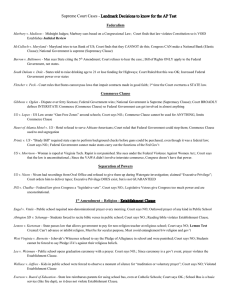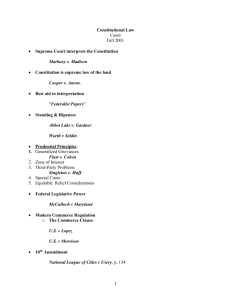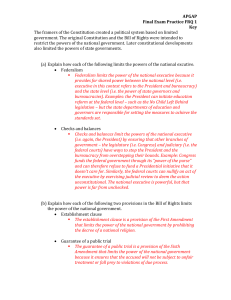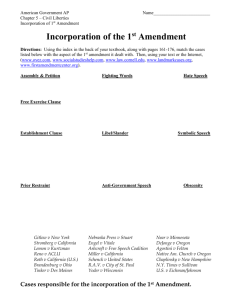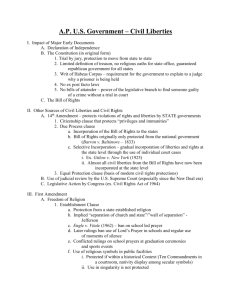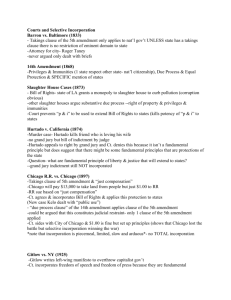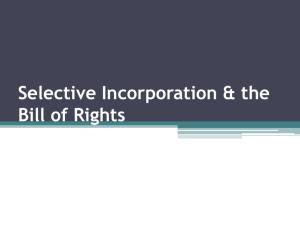Ppt: SC Cases
advertisement
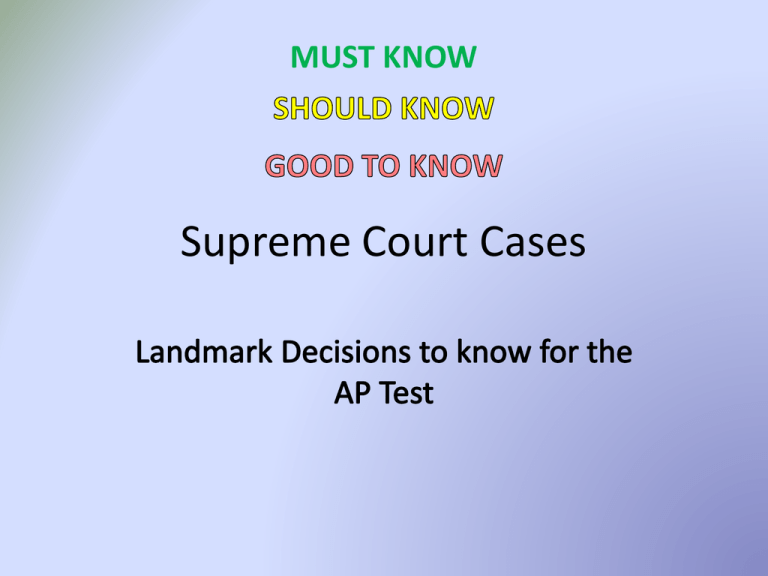
MUST KNOW Supreme Court Cases Federalism Marbury v. Madison • Midnight Judges; Marbury sues based on a Congressional Law • Court finds that law violates Constitution so is VOID • Establishes Judicial Review McCulloch v. Maryland • Maryland tries to tax Bank of US; Court finds that they CANNOT do this • Congress CAN make a National Bank (Elastic Clause) • National Government is supreme (Supremacy Clause) Barron v. Baltimore • Man sues State citing the 5th Amendment; Court refuses to hear the case. • Bill of Rights ONLY apply to the Federal Government, not states. Overturned by: Gitlow v. New York South Dakota v. Dole • States told to raise drinking age to 21 or lose funding for Highways; Court Ruled that this was OK • Increased Federal Government power over states Fletcher v. Peck • Court rules that States cannot pass laws that impair contracts made in good faith • 1st time the Court overturns a STATE law. Commerce Clause Gibbons v. Ogden • Dispute over ferry licenses; Federal Government wins • National Government is Supreme (Supremacy Clause) • Court BROADLY defines INTERSTATE Commerce (Commerce Clause) so Federal Government can get involved in almost anything US v. Lopez • US Law create “Gun-Free Zones” around schools; Court says NO. • Commerce Clause cannot be used for ANYTHING, limits Commerce Clause Heart of Atlanta Motel v. US • Hotel refused to serve African-Americans; Court ruled that Federal Government could stop them • Commerce Clause used to end segregation Printz v. US • “Brady Bill” required state cops to perform background checks before guns could be purchased, even though it was a federal law; Court says NO. • Federal Government cannot make states carry out the functions of the Fed Gov’t US v. Morrison • Woman is raped at Virginia Tech. Rapist is not punished. She sues under the Federal Violence Against Women Act.; Court says that the law is unconstitutional. • Since the VAWA didn’t involve interstate commerce, Congress doesn’t have that power. Separation of Powers US v. Nixon • Nixon had recordings from Oval Office and refused to give them up during Watergate investigation; claimed “Executive Privilege” • Court orders him to deliver tapes • Executive Privilege DOES exist, but is not GUARANTEED INS v. Chadha • Federal law gives Congress a “legislative veto”. Court says NO. • Legislative Vetoes give Congress too much power and are unconstitutional. st 1 Amendment - Religion Engel v. Vitale • Public school required non-denominational prayer every morning. Court says NO • Outlawed prayer of any kind in Public School Abington SD v. Schempp • Students forced to recite bible verses in public school; Court says NO. • Reading bible violates Establishment Clause. Lemon v. Kurtzman • State passes law that allows government to pay for non-religion teacher at religious school; Court says NO • Lemon Test Created – Can’t advance or inhibit religion – Must be for secular purpose – Must avoid entanglement b/w religion and gov’t West Virginia v. Barnette • Jehovah’s Witnesses refused to say the Pledge of Allegiance in school and were punished; Court says NO • Students cannot be forced to say Pledge if it’s against their religious beliefs. Lee v. Weisman • Public school opens graduation ceremony with a prayer. Court says NO. • Since ceremony is a gov’t event, prayer violates the Establishment Clause. Wallace v. Jaffree • Kids in public school were forced to observe a moment of silence for “meditation or voluntary prayer”; Court says NO • Violated Establishment Clause Everson v. Board of Education • State law reimburses parents for using school bus, even at Catholic Schools; Court says OK. • School Bus is a basic service (like fire dept), so it does not violate Establishment Clause. INCORPORATION CASE st 1 Amendment - Religion Reynolds v. US • State law outlaws polygamy. Mormons sue. Court upholds law. • All religious beliefs are protected, but NOT all religious practices. States can ban polygamy. Wisconsin v. Yoder • Amish parents sued to have their students removed from school after 8th grade because it is against their beliefs. Court said OK. • This is protected under the Free-Exercise Clause Oregon v. Smith • Native Americans were fired for using Peyote as part of a religious ceremony. The Court upheld the firing. • States can limit the free-exercise of religion if it involves illegal activities. Jacobson v. Massachusetts • State law required vaccinations of children. Jacobson refused on religious grounds. The Court upheld the law. • Free-Exercise can be limited if it serves a compelling government interest. st 1 Amendment – Expression Gitlow v. New York • Gitlow arrested for advocating communism and overthrow of Government. Court upholds his conviction – BUT – • Freedom of Speech is protected from States too • BEGINS INCORPORATION PROCESS INCORPORATION CASE Schenck v. US • Schenck found guilty of violating Sedition Act by distributing anti-war pamphlets during WWI.; Court upholds conviction. • Free Speech CAN be limited • Creates “Clear-and-Present Danger” Test Tinker v. Des Moines • Students suspended for wearing arm-band in protest of Vietnam War; Court says NO • Symbolic Speech protected too • Students don’t lose rights “at schoolhouse gates”. Texas v. Johnson • Johnson arrested for burning US Flag in protest. Court says NO • Symbolic Speech Protected, even if we don’t like it. Chaplinsky v. New Hampshire • Man arrested for shouting insults and “fighting words” at police officer. Court upholds conviction. • Certain types of speech not protected by 1st Amendment. Miller v. California • State law bans sending obscene material through the mail. The Court says OK. • Creates Obscenity Test – Avg person finds it elicits lust – Avg person finds it offensive – Lacks political, artistic, scientific value. Dennis v. US • Communist leaders convicted of trying to overthrow the government. Court says OK. • Speech that advocates the violent overthrow of the US is not protected by the 1st Amendment. Overturned by: Brandenburg v. Ohio Near v. Minnesota • State law stops newspapers from publishing “lewd or lascivious” material. Court says NO. • Limiting Free Press is rarely ok. Prior Restraint is (almost) never OK. INCORPORATION CASE Hazelwood v. Kulheimer • Principal at school removed 2 articles from student newspaper. Court says it is OK. • Prior Restraint is ok in schools to maintain good learning environment. New York Times v. Sullivan • NY Times published ad in defense of MLK Jr, that was unfavorable of city officials in Alabama. The officials sued for Libel because some of the facts were incorrect. Court says NO. • In order for libel to be true against public officials, actual malice must be proven. Roth v. US • A man is arrested for selling obscene books. The Court says OK. • Obscenity is not protected by the 1st Amendment. New York Times v.US • Pentagon Papers Case; NYT wants to publish leaked, classified documents. Government tries to stop them. Court says they can publish the documents. • The documents would not create a “clear-andpresent danger”, so prior restraint is not allowed. Brandenburg v. Ohio • KKK leader gives a speech and was arrested for promoting unlawful acts. Court overturns the conviction. • The speech must be likely to incite lawless acts in order to be prohibited. st 1 Amendment - Expression NAACP v. Alabama • Alabama wanted to stop NAACP, so they passed a law that required them to make their membership public; Court says NO. • Freedom of Association is protected if there is no “overriding valid state interest” to limit it. Boy Scouts of America v. Dale • Boy Scouts exclude Homosexuals from organization; Court says it’s OK • Freedom of Association allows private groups to exclude people if they go against the groups fundamental principles. Due Process Mapp v. Ohio • Woman arrested after an illegal search finds obscene material; Court throws out evidence. • Creates Exclusionary Rule – Evidence obtained illegally cannot be used in court INCORPORATION CASE Miranda v. Arizona • Miranda confesses to crime after interrogation because he didn’t know his rights; Court says NO • Not knowing rights doesn’t take them away. • Creates Miranda Rights – Police must inform suspects of rights before arrest Gideon v. Wainwright • Gideon found guilty because he couldn’t afford a lawyer. Court overturns conviction. • Right to an attorney, even for those who cannot afford it. • Creates Public Defenders Office. INCORPORATION CASE Escobedo v. Illinois • Escobedo asks for lawyer, but cops say no and continue to question him; he eventually confesses; Court throws out conviction. • Once a lawyer is requested, questioning must stop. “Absolute Right” to remain silent. California v. Acevedo • Trunk of car is searched because cops have probable cause that there are drugs inside. Drugs are found and man is arrested. Court says OK. • Containers can be searched (without a warrant) in cars if there is probable cause that evidence is inside. US v. Leon • Cops search house with a search warrant that was incorrectly given. Drugs are found and man is arrested. Court says OK. • Relaxes “exclusionary rule” • Creates Good-Faith Exception – If cops act in “good faith”, evidence can still be used New Jersey v. TLO • Student is caught smoking in bathroom. Her bag is searched and rolling papers are found. She is suspended. Court upholds her suspension. • Students have 4th Amendment rights BUT, probable cause isn’t needed, just reasonable suspicion Katz v. US • Cops tap public phones without a warrant and catch Katz gambling. Court overturns conviction. • 4th Amendment can’t intrude on “reasonable expectation of privacy”, which include private phone calls. Furman v. Georgia • Furman is sentenced to death for Murder; Court says NO. • Death penalty is given out too randomly (usually along racial lines) • 2-tier trial system put in place. – 1st = guilt/innocence – 2nd = death penalty/life in prison Gregg v. Georgia • Gregg is sentenced to death for Murder. Court says OK. • Death Penalty is NOT cruel and unusual punishment if applied fairly. Privacy and Abortion Griswold v. Connecticut • State law bans the sale and use of contraception; Court says NO • Creates Right to Privacy Roe v. Wade • Roe wants an Abortion but Texas law says they are illegal; Court allows abortion. • Right to Privacy includes abortion. States cannot ban abortion in 1st or 2nd trimester. Webster v. Reproductive Health Services • Limits placed on Abortions; Court says OK • Abortion STILL LEGAL, but states can limit it as long as limits are reasonable. Planned Parenthood v. Casey • States further limit abortion; Court says OK • Abortion STILL LEGAL, but states can further limit it. • Creates Undo Burden Standard – Limits cannot place undo burden on mothers. Equal Protection Clause Scott v. Sanford • Dred Scott, a slave, sues for his freedom because his owner moved to a “free state”; Court says NO • Slaves are property and so can be moved anywhere and also cannot sue in court because property has no legal rights. Overturned by: 14th Amendment Plessy v. Ferguson • Jim Crow Laws segregate blacks and whites; Court says OK • Creates Separate-but-Equal Doctrine Overturned by: Brown v. Board of Education Brown v. Board of Education • Black girl wants to go to white school; Court says OK • Separate-but-equal is inherently unequal • Outlaws school segregation. Swann v. Charlotte-Mecklenburg BOE • After Brown, schools desegregated slowly. Court orders “Busing” to achieve racial balance. • Busing legal; the existence of all-black schools is considered an attempt to discriminate. Korematsu v. US • Japanese Internment during WWII; Court says OK • National Security more important than individual liberties. Regents of University of California v. Bakke • White man denied access to UC Davis because of Affirmative Action; Court says NO • Numerical Quotas illegal, but race can be a factor in deciding in college admissions. Gratz v. Bollinger • White student denied access to University of Michigan because of automatic point system for minorities; Court says NO. • Automatic points based on race is arbitrary and unreasonable. Grutter v. Bollinger • White student denied access to University of Michigan because race was used as a “plus factor”.; Court says OK • Race can be used as a “plus factor” because it is “narrowly tailored”. Adarand Constructors v. Pena • State law gives preference to minority-owned companies; Court says NO • ALL racial discrimination must live up to the “strict scrutiny” test and is considered inherently suspect. Equal Protection Clause Reed v. Reed • State law gives preference to men over women in executing a will; Court says NO • Laws differentiating men and women cannot be arbitrary. Must be more than “reasonable”. Rostker v. Goldberg • Draft laws exclude women; Court says OK • Congress can draft men, but exclude women US v. Virginia • VMI, a military school in Virginia, does not allow women to enroll. Court says NO. • Women are allowed to join military schools Loving v. Virginia • State law outlaws inter-racial marriage.; Court says NO • Government had no compelling reason to ban inter-racial marriages. Marriage is a personal, not government, matter. Lawrence v. Texas • Texas law bans homosexuality; Court says NO • States cannot ban homosexuality. Windsor v. US • Defense of Marriage Act states that Federal Government only recognizes marriage between a man and a woman – even if individual states recognize gay marriage; Court says NO. • Marriage is a State issue and Federal Government cannot define it. Incorporation Palko v. Connecticut • Palko argues that 5th Amendment applies to states too. Court says NO – but some rights DO apply to states. • “Fundamental” liberties are protected from states too. • Begins SELECTIVE INCORPORATION Voting and Elections Baker v. Carr • People challenge how state apportionment took place. This had always been considered a “political question” left to Congress. Court rules on issue. • Created the precedent that the Court can rule on “political questions”, especially apportionment. Reynolds v. Sims • In Alabama, states were apportioned regardless of population. Some ratios were as bad a 40:1. Court says NO. • As much as is possible, state districts must be of equal population Wesberry v. Sanders • Georgia districts were very uneven in terms of population. Court says NO. • By keeping districts uneven, one person’s vote counted more than another’s. As much as is possible, Congressional districts must be of equal population so that everyone’s vote has the same power. Buckley v. Valeo • FEC sets limits on campaign contributions. Court says limits on money to candidates are OK; but, limits on independent expenditures is NOT. • Money = Speech, so it’s protected. Citizens United v. FEC • BCRA bans Corporations or Unions from funding campaigns; Court says NO. • Corporations = people, people have freedom of speech, money = speech, so…corporations have freedom of speech, which includes spending on political advertising, which cannot be limited. McConnell v. FEC • BCRA regulates and limits “electioneering communications”, even if no candidate is expressly mentioned. Court says OK. • FEC can limit some “electioneering communications”. Overturned by: Citizens United v. FEC
